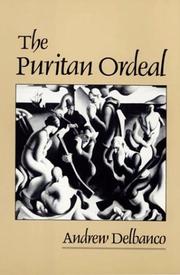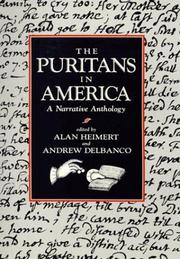| Listing 1 - 3 of 3 |
Sort by
|

ISBN: 0674034171 9780674034174 0674740556 0674740564 9780674740563 Year: 2022 Publisher: Cambridge, MA
Abstract | Keywords | Export | Availability | Bookmark
 Loading...
Loading...Choose an application
- Reference Manager
- EndNote
- RefWorks (Direct export to RefWorks)
More than an ecclesiastical or political history, this book is a vivid description of the earliest American immigrant experience. It depicts the dramatic tale of the seventeenth-century newcomers to our shores as they were drawn and pushed to make their way in an unsettled and unsettling world.
Puritans. --- Puritans --- Precisians --- Church polity --- Congregationalism --- Puritan movements --- Calvinism

ISBN: 0674740653 0674740661 0674038495 Year: 1985 Publisher: Cambridge Harvard University Press
Abstract | Keywords | Export | Availability | Bookmark
 Loading...
Loading...Choose an application
- Reference Manager
- EndNote
- RefWorks (Direct export to RefWorks)
Exiled from England, the Puritans settled in what Cromwell called "a poor, cold, and useless" place--where they created a body of ideas and aspirations that were essential in the shaping of American religion, politics, and culture. In a felicitous blend of documents and narrative Heimert and Delbanco recapture the sweep and restless change of Puritan thought from its incipient Americanism through its dominance in New England society to its fragmentation in the face of dissent from within and without.
American literature --- anno 1500-1799 --- Puritans --- Puritains --- Precisians --- Church polity --- Congregationalism --- Puritan movements --- Calvinism --- Doctrines.
Book
ISBN: 0674064909 0674069307 9780674069305 9780674064904 9780674064447 0674064445 Year: 2012 Publisher: Cambridge, Mass. Harvard University Press
Abstract | Keywords | Export | Availability | Bookmark
 Loading...
Loading...Choose an application
- Reference Manager
- EndNote
- RefWorks (Direct export to RefWorks)
The abolitionists of the mid-nineteenth century have long been painted in extremes--vilified as reckless zealots who provoked the catastrophic bloodletting of the Civil War, or praised as daring and courageous reformers who hastened the end of slavery. But Andrew Delbanco sees abolitionists in a different light, as the embodiment of a driving force in American history: the recurrent impulse of an adamant minority to rid the world of outrageous evil.Delbanco imparts to the reader a sense of what it meant to be a thoughtful citizen in nineteenth-century America, appalled by slavery yet aware of the fragility of the republic and the high cost of radical action. In this light, we can better understand why the fiery vision of the ";abolitionist imagination"; alarmed such contemporary witnesses as Herman Melville and Nathaniel Hawthorne even as they sympathized with the cause. The story of the abolitionists thus becomes both a stirring tale of moral fervor and a cautionary tale of ideological certitude. And it raises the question of when the demand for purifying action is cogent and honorable, and when it is fanatic and irresponsible. Delbanco's work is placed in conversation with responses from literary scholars and historians. These provocative essays bring the past into urgent dialogue with the present, dissecting the power and legacies of a determined movement to bring America's reality into conformity with American ideals.
| Listing 1 - 3 of 3 |
Sort by
|

 Search
Search Feedback
Feedback About UniCat
About UniCat  Help
Help News
News